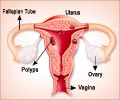A study led by researchers at the University of Southern California , reports that postmenopausal women who consume alcohol frequently double their risks of endometrial cancer.
A study led by researchers at the University of Southern California, reports that postmenopausal women who consume alcohol frequently double their risks of endometrial cancer.
“This is the first prospective study to report a significant association between alcohol and endometrial cancer,” says Veronica Wendy Setiawan, assistant professor of preventive medicine at the Keck School of Medicine of USC. “Previous studies have shown that alcohol consumption has been associated with higher levels of estrogens in postmenopausal women, which could be the mechanism by which daily alcohol intake increases one’s risk of endometrial cancer.”According to the National Cancer Institute, endometrial cancer is the most common cancer of the female reproductive system. It accounts for approximately six percent of all cancers in women.
“It’s important for women, especially postmenopausal women, to know and understand the consequences of high alcohol consumption. It does not affect just the liver, but alcohol has been associated with breast cancer and now endometrial cancer,” continues Setiawan.
Researchers drew upon data from the Multiethnic Cohort Study (MEC), an epidemiological study of more than 215,000 people from Los Angeles and Hawaii created in 1993 by Brian Henderson, M.D., dean of the Keck School of Medicine of USC, and Laurence Kolonel, M.D., Ph.D. of the University of Hawaii.
The study followed 41,574 postmenopausal African-American, Japanese-American, Latina, Native-Hawaiian and White women in Los Angeles and Hawaii for an average of eight years. Data on alcohol intake and endometrial cancer risk factors were obtained from a baseline questionnaire.
“This discovery is important as it suggests that changes to certain lifestyle choices may potentially help alter risk of the disease,“ says Henderson, the paper’s senior author. “However, these findings are preliminary and must be investigated further before any recommendations about alcohol consumption can be made.”
Advertisement
“Our data suggest that lean women may be more sensitive to modest elevations in hormone levels resulting from alcohol drinking than obese women who already have high levels of estrogen and therefore mask alcohol as an independent risk factor,” concludes Setiawan. “Again, this is all preliminary and more studies with sufficient numbers of heavy drinkers are needed to corroborate our finding.”
Advertisement
LIN /J











